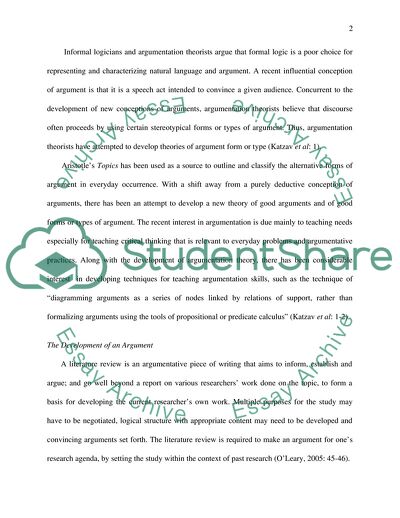
- Home
- Free Samples
- Premium Essays
- Editing Services
- Extra Tools
- Essay Writing Help
- About Us
- Studentshare
- Subjects
- Miscellaneous
- Argument research
Argument research - Essay Example

- Subject: Miscellaneous
- Type: Essay
- Level: Masters
- Pages: 4 (1000 words)
- Downloads: 0
- Author: okuvalis
Extract of sample "Argument research"
From the intellectual context and background of a particular development will emerge the nature and character of the implications of the particular development or argument (Hart: 26). An argument is an attempt to convince others of the validity or logic of a perspective seen by the researcher. It consists of two components: making a point or statement, and providing sufficient reason or evidence for the point to be accepted by others (Hart: 80). Argument may be defined as the process in communication in which logic is used to influence others, to change attitudes or to establish new ones.
Argument is the process of demonstrating conclusions from facts or assumptions that have been established as truths, by a “logical mode of persuasion” (Huber & Snider: 3). Argument is a vital part of not only academic research, but also of everyday natural language. Informal logicians and argumentation theorists argue that formal logic is a poor choice for representing and characterizing natural language and argument. A recent influential conception of argument is that it is a speech act intended to convince a given audience.
Concurrent to the development of new conceptions of arguments, argumentation theorists believe that discourse often proceeds by using certain stereotypical forms or types of argument. Thus, argumentation theorists have attempted to develop theories of argument form or type (Katzav et al: 1). Aristotle’s Topics has been used as a source to outline and classify the alternative forms of argument in everyday occurrence. With a shift away from a purely deductive conception of arguments, there has been an attempt to develop a new theory of good arguments and of good forms or types of argument.
The recent interest in argumentation is due mainly to teaching needs especially for teaching critical thinking that is relevant to everyday problems and argumentative
...Download file to see next pages Read MoreCHECK THESE SAMPLES OF Argument research
MLA ARGUMENT RESEARCH PAPER ON CIVIL WAR IN LIBERA
Business information system
Argument research paper
(argument research paper) advertising
Proposal Argument Research Paper
Accounting Information Systems - Information Needs for the AIS
Argument research task
Argument research paper

- TERMS & CONDITIONS
- PRIVACY POLICY
- COOKIES POLICY